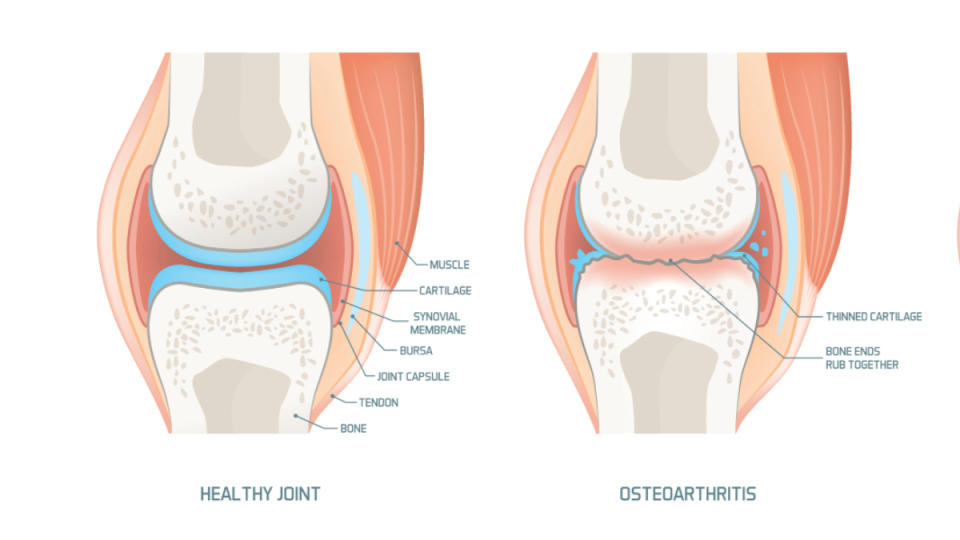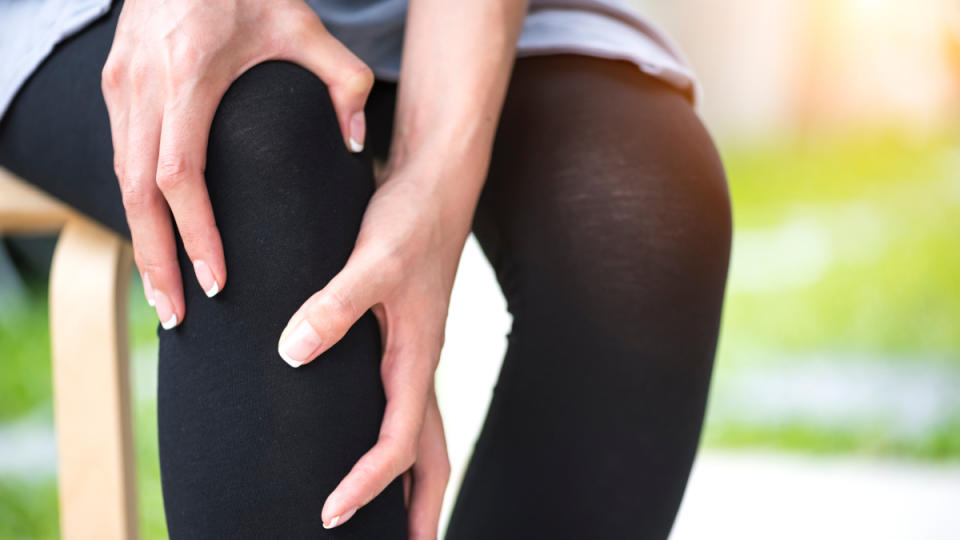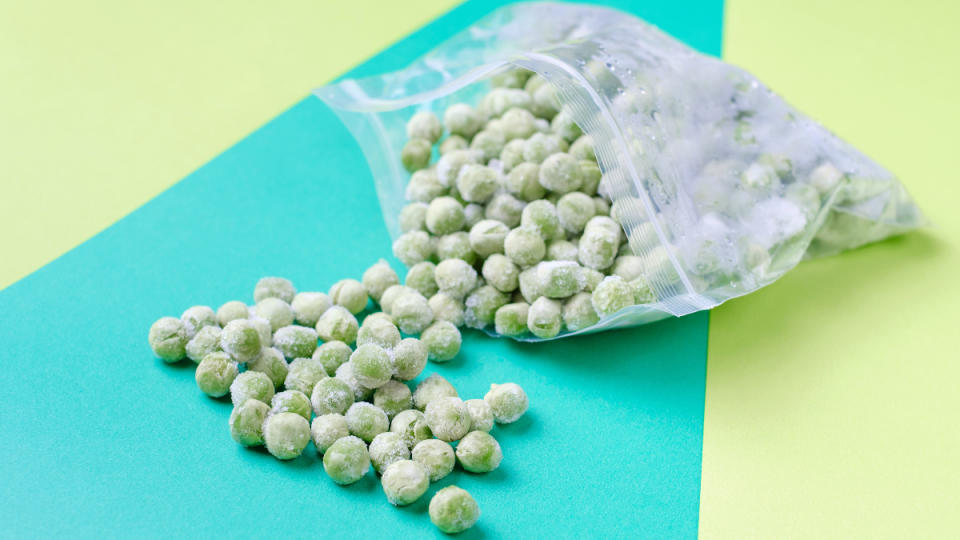Doctors Reveal the 5 Best Self-Care Tips That Ease Arthritis Pain — No Pricey Rx Required
Have you noticed stiffness in your joints as you get dressed in the morning, or achiness as you head downstairs to make coffee? This could signal arthritis, a degenerative condition that can impact any of your joints and make everyday activities painful. The good news: You don't have to let stiffness or discomfort throw a wrench in your routine. Doctors say there are easy, inexpensive (or free!) arthritis self-care remedies that can make a world of difference.
Arthritis explained
Odds are even if you don't have arthritis, you know someone who does. Its impact is incredibly widespread — we’re talking over 50 million adults affected. It’s also much more likely to hit as you get older: One in four people between ages 45 and 64 are living with the condition.
There are different types of arthritis. The two main types are osteoarthritis, the predominant one that typically occurs as we get older, and inflammatory arthritis, which encompasses autoimmune disorders like rheumatoid arthritis and psoriatic arthritis, says Joseph A. Gil, MD, an orthopedic surgeon at University Orthopedics in East Providence, RI.
Here’s how to better understand it: Inside your joints is a tissue called cartilage, explains Kimberly J. Templeton, MD, an orthopedic surgeon with the University of Kansas Health System and past president of the American Medical Women’s Association. “It’s a lining tissue that has fluid in it," she says. "As you move your joint, it allows the two bones that make up the joint to glide past each other without any friction. Arthritis of any kind is where that cartilage starts to break down.” When that happens and those surfaces start to rub up against each other, it can cause stiffness, pain and swelling, she says.

Symptoms of arthritis
Stiffness is usually one of the first signs of arthritis, notes Dr. Gil. “So even the patients with mild arthritis will say that their joints feel like they’re hard to get going in the morning.” There may also be a dip in dexterity, which makes doing fine motor tasks like buttoning a shirt harder than it used to be.
As the condition progresses, the pain can become more of a dull ache — “like a toothache as opposed to something sharp,” says Dr. Gil. Though that sharp pain can show up as arthritis gets more severe.
Unfortunately, you can develop osteoarthritis in any joint, from the shoulder to the ankles. But it most often shows up in places like the knees, hips (that explains why you often hear of knee and hip replacements) and the hands.
“I see patients all the time, every day, in the office come in with pain at the base of the thumb or pain throughout their knuckles, and that tends to be arthritis if they do come to our office,” says Dr. Gil, who focuses on hand and wrist surgery.
Related: Knee Pain When Bending? These 8 MD-Approved Tricks Help End the Ache Naturally
Arthritis is more common in women
“Women have more arthritis than men [in] every joint except probably the shoulder, as far as we know," notes Dr. Templeton. There are several different reasons for this, but one of the biggest is our hormones.
“The lining tissue that we talked about does recognize estrogen," she explains. "So there’s some thought that estrogen does help maintain that cartilage. And so as you get older or if for some other reason your estrogen levels start to drop, that may also impact how healthy the cartilage is and may increase the risk of developing arthritis.”

Is arthritis hereditary?
The answer to this isn’t super straightforward. Both patients with and without a family history can develop osteoarthritis. Dr. Gil says that some genetic markers have been identified, but “there’s not one specific marker that you need to have to develop arthritis.”
And as Dr. Templeton explains, “There is some research that shows that, yes, arthritis will run in families. But part of the issue is that there’s so many things that can lead to arthritis. Sometimes it’s hard to parse out what is inherited versus what is just all of the other things that impact arthritis, whether it’s injury risk or hormones or weakness.”
And if you’re looking at family history, it can also be hard to separate genetics from behaviors. For example, if you come from a family that doesn’t necessarily have the healthiest eating or exercise habits — high BMI and lack of movement can contribute to osteoarthritis — you could wind up adopting those same patterns and may develop arthritis, explains Dr. Templeton.
“So yes, there is a genetic component to that for some people," she says. "But arthritis is so complex, it’s hard to attribute it solely to genetics.”
Dr. Gil also notes that, in his experience, the condition tends to be more extensive and happens earlier in patients with a strong family history. For example, someone without a strong predisposition may just have isolated, mild thumb arthritis at the base of the thumb, whereas someone with a family history may present with more widespread hand arthritis, he says.
Related: Joint Pain + Rash May Be Early Warning Signs of Psoriatic Arthritis — Here’s What Can Help
The best arthritis self-care remedies
Whether joint stiffness has just set in or you’re trying to prevent existing aches from getting worse, there are arthritis self-care remedies you can turn to. Here are a few ways to help, no matter which joint is causing you pain.
1. Stretch it out
“For me, I think the biggest thing is really work on motion,” says Dr. Gil. That’s because the natural process of osteoarthritis is for the joints to stiffen and lose mobility. So staying active and flexible is important, he says. In particular, focus on activities where you’re not pounding your achy joint, advises Dr. Templeton.
Instead, go easy on yourself and consider lower-impact activities. Simply walking can be helpful when it comes to arthritis self-care, as can using an elliptical machine or doing Pilates or yoga. Never tried yoga? Consider chair yoga, which easy on joints and perfect for beginners. Check out the video below for a visual how-to.
Related: “Two Simple Chair Yoga Moves Saved Me From Chronic Pain and Constant Falls!”
Tip: Not into yoga? No problem! Swimming and water aerobics are good choices, too. A review in the journal Healthcare found that “aquatic exercises”, or cardio workouts done in a pool, helped with everything from easing joint pain to providing a boost in quality of life.
2. Reach for frozen peas
Combat arthritis from morning to night with a hot and cold technique from Dr. Gil. “I do think that heat in the morning, when patients wake up stiff, is helpful to get the joint going,” he says. “Then at nighttime, when the patient has been using the joint all day, I do think putting ice on is very helpful in cooling off the inflammation and maybe giving them a better night’s sleep if they spend some time icing.”
When it comes to heat, make sure it’s not so hot that it burns your skin or is painful, says Dr. Gil. A warm heating pad should do the trick. If you’re dealing with arthritis in your hands, you can also try immersing your hand in warm paraffin wax for arthritis self-care, he recommends. One to try: Conair True Glow Thermal Paraffin Spa Wax Treatment (Buy from Amazon, $29.99).
And instead of opting for pricey ice packs at the end of the day, Dr. Templeton suggests simply using a bag of frozen peas. Besides being inexpensive, they have the added benefit of molding to the painful joint. Just don’t put the bag directly on your skin (lay a washcloth down first) and take it off after about 20 minutes, she advises. (Click through to learn how heat and ice eases sciatica, too.)

3. Pick protein
Another arthritis self-care strategy that cane help: Eating more protein and veggies while scaling back on carbs. Why? Studies suggest that a low-carb diet can help cut inflammation, says Dr. Gil, who notes that the strategy hasn’t yet been widely studied but patients talk about it being helpful.
There is some research that looks promising: A small University of Alabama study found that compared with a low-fat diet or no specific diet at all, a low-carb diet was helpful in easing pain, upping quality of life and lowering oxidative stress that can worsen arthritis. (For an easy way to scale back on carbs and up your protein intake, check out this delicious protein bread recipe.)
4. Sip turmeric tea
Though there’s not a ton of research on it just yet, Dr. Gil says that one of the things he hears in his practice and has passed along to patients is that taking turmeric — like in tea, as a spice in food or a supplement — may be helpful when it comes to arthritis self-care. It’s thought to help reduce inflammation and, as he notes, people have said it “makes them feel better when they take it for a period of time.” One to try: Traditional Medicinals Organic Turmeric Tea (Buy from Amazon, $4.92). (Click through to learn how turmeric speeds weight loss, too.)
Tip: Try whipping up a comforting cup of golden milk. Simply add a splash of milk (any kind — whether cow's milk, coconut milk, almond milk or oat milk) to your turmeric tea, then stir in a pinch of cinnamon and black pepper. Sweeten with honey or maple syrup to taste, if desired.

Similarly, Dr. Gil has said his patients have found cinnamon, vitamin D, calcium and fish oil to be helpful as well, though research in still limited. In one study in the journal Rheumatology Advances in Practice, people with osteoarthritis who supplemented with fish oil daily for 16 weeks saw their pain drop by 42%. One to try: Life Extension Mega EPA/DHA Concentrated Omega-3 Fish Oil Blend (Buy from Amazon, $18.94).
5. Consider these OTC options
If you’re feeling pain, try medications like Tylenol or anti-inflammatories like Advil, suggest both Dr. Gil and Dr. Templeton. These can help dull discomfort plus tame inflammation. Note: While it’s okay for some people to take these over-the-counter meds daily, if you have certain conditions (like a stomach ulcer) it’s not recommended. Be sure to check in with your doctor first, says Dr. Templeton.
She also advises against taking opioids such as oxycodone for arthritis. “Opioids are designed for acute pain management,” she says. “There’s no evidence to say that they work for chronic pain such as osteoarthritis.”
Arthritis self-care: Talking to your doctor
If there’s something impacting you, your ability to function and your quality of life, and nobody’s asking about it, “then you need to speak up and ask,” says Dr. Templeton. “Sometimes that’s hard because we think, if it’s important somebody’s going to ask.”
But it might not be on your provider’s radar, or they may assume if you didn’t mention it, there’s no issue. “That will not only help them help you as a patient, but also, just in and of itself, I think it’s going to help you deal better with the situation because you’re speaking up and seeking help,” she advises.
For more ways to soothe joint pain:
More Than Half Of Us ‘Walk Crooked’ — How That Sets Us Up For Joint Pain + How To Fix It
Research: Castor Oil Packs Proven to Relieve Joint Pain, Constipation & Menstrual Cramps
13 Best Hand Massagers for Arthritis, Carpal Tunnel, and Stiff Joints
This content is not a substitute for professional medical advice or diagnosis. Always consult your physician before pursuing any treatment plan.
Woman's World aims to feature only the best products and services. We update when possible, but deals expire and prices can change. If you buy something via one of our links, we may earn a commission. Questions? Reach us at [email protected].
Solve the daily Crossword

